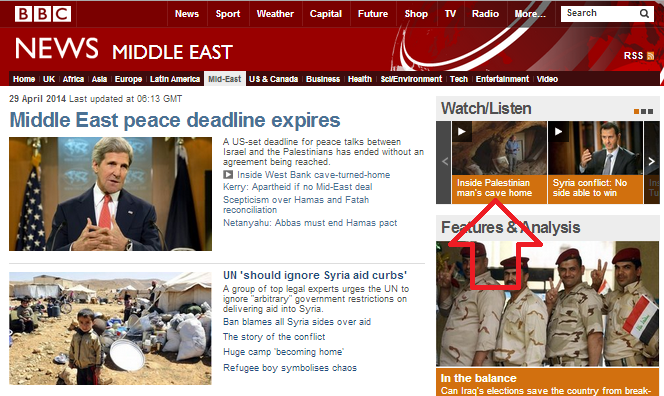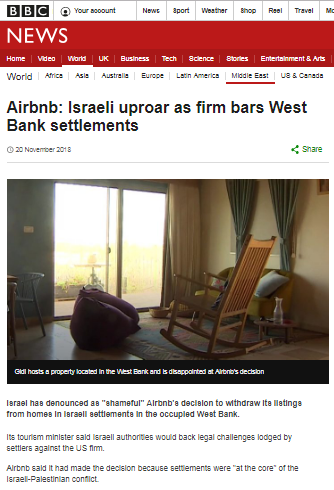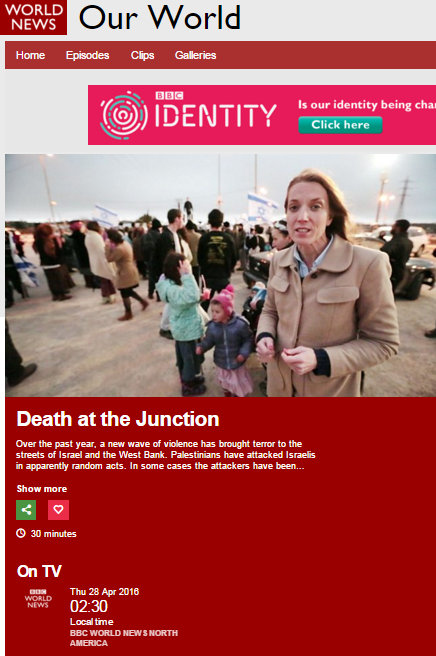As part of the process which led to the publication of the Thomas Report on “Impartiality of BBC Coverage of the Israeli-Palestinian Conflict” in 2006, BBC news management produced a document titled “Editorial coverage of Israel and the Palestinians” which laid out the corporation’s strategies for ensuring accurate and impartial reporting of that topic, in line with BBC editorial guidelines. Included in that document is a description of the role of BBC Middle East Editor – a position created in 2005.
“The challenge for our daily news coverage is to provide an appropriate balance between the reporting of a ‘spot news’ event and the analysis that might help set it in its context.
This challenge is particularly acute on the television news bulletins, where space is at a premium, and because the context is often disputed by the two sides in the conflict. To add more analysis to our output, our strategy is to support the coverage of our bureau correspondents with a Middle East editor.
Jeremy Bowen’s new role is, effectively, to take a bird’s eye view of developments in the Middle East, providing analysis that might make a complex story more comprehensive or comprehensible for the audience, without the constraints of acting as a daily news correspondent. His remit is not just to add an extra layer of analysis to our reporting, but also to find stories away from the main agenda.”
Just such a case – in which an event needed to be “set in its context” and BBC coverage required “analysis” and “support” in order to “make a complex story more comprehensive or comprehensible for the audience” – occurred on April 29th 2014 when the time frame of the latest round of American-brokered negotiations between Israel and the PLO came to its unfruitful conclusion.
So what did Jeremy Bowen produce in order to make that event better understandable to BBC audiences? Part of the answer to that comes in the form of a filmed report shown on BBC television news programmes which also appeared on the BBC News website’s Middle East page under the heading “Inside Palestinian man’s cave home”.
The report itself is titled “Middle East peace: Symbols of scepticism on West Bank” and it opens with Bowen in Hebron.
“I’m in Hebron on the Israeli-occupied West Bank and it’s a place where fences and soldiers divide the population; large population of Palestinians who live in that direction with…from Jewish settlers who live cheek by jowl, some of them over there.”
Any Middle East Editor genuinely committed to providing BBC audiences with the crucial context necessary to understand the situation would of course have pointed out at this juncture that the overwhelming majority of Palestinians in Judea & Samaria – including those in Hebron – live in areas A and B, which are under the control of the Palestinian Authority. Any journalist with integrity would also have clarified that Israelis living in Hebron do so because in 1997, the Palestinian Authority signed the Hebron Protocol, thus agreeing to their presence in area H2 of the city and to the deployment of Israeli security forces there. Jeremy Bowen, however, prefers to paint an inaccurate and misleading picture. He continues:
“When I first came to live in this part of the world twenty years ago, it was at the high point of the peace process and there were lots of Israelis and Palestinians who really thought there was a good chance that their lives were about to get a lot better. More than two decades on, with no peace agreement and the conflict continuing, I think that people now are sceptical – even cynical – about the chances of things improving. And they get on with their daily lives; there are shops, people go to work, but it means there is – for both Israelis and Palestinians – a very uncertain future.”
Bowen then moves to an unidentified location where he tells an unsourced, context-free story about an anonymous man and repeats hearsay which audiences have no way of verifying.
“This is a cave that’s been made into a home by a Palestinian man whose house in occupied East Jerusalem was demolished by the Israelis. Now, he admits that he’s making a political point. He says he’s living here because he wants to show that Palestinians will not be shifted from their land and he says as well that twenty years of peace talks have made his life not better, but much worse because so many Israeli settlers have come to live around here.”
Having already opted to use the partial term “Israeli-occupied West Bank” in his opening sentence, Bowen now promotes the equally politically loaded term “occupied East Jerusalem”. He of course does not bother to inform audiences of any details of the purported house demolition – including the all-important question of whether the construction had building permits. Notably, Bowen also promotes the politically loaded concept of “Palestinian land” and fails to inform BBC audiences that no clause in the Oslo Accords – willingly signed by the internationally recognised representatives of the Palestinian people – prevents Israelis from relocating to or living in communities in Judea & Samaria. He goes on:
“As a matter of fact, the one thing that unites Israelis and Palestinians I’d say more than anything else is their scepticism about peace negotiations and where they might ever lead.”
Bowen then relocates once again and is to be found standing by a portion of the anti-terrorist fence constructed from concrete – less than 10% of the structure as a whole.
“The Israelis say their first duty is to protect their people, which is why, they say, they have been forced to build walls and fences to separate themselves from the Palestinians.”
Of course the real aim of the anti-terrorist fence is not to “separate” Israelis from “the Palestinians” as Bowen inaccurately states, but to prevent terror attacks on Israeli civilians. Bowen however makes no mention whatsoever of the second Intifada or of the thousands of Israeli victims of Palestinian terror, thus deliberately denying BBC audiences the necessary context his job description obliges him to provide. He continues:
“Now for twenty years, off and on, they’ve been talking – the Israelis and Palestinians – about creating a Palestinian state alongside Israel – the so-called two-state solution – the idea being that they would split the land that they have been fighting over. Now look at this [points to a concrete section of the anti-terrorist fence]. It hasn’t happened.”
Not only is Bowen clearly herding audience towards the impression that peace and a Palestinian state have not been realized because of the anti-terrorist fence, he is also clearly steering viewers towards a mistaken and superficial view of the conflict as being one purely about land. He fails to make any mention of the fact that the Palestinian Authority chose to sabotage the Oslo Accords by initiating the second Intifada and fails to remind viewers of Mahmoud Abbas’ failure to respond to the 2008 Olmert offer. Bowen concludes:
“Maybe the time has come to face an uncomfortable fact: that there will be no two-state solution. So commentators have been talking about alternatives and nobody has come up with anything that looks any easier than this solution they’ve been trying and failing to get for more than twenty years, which is why – on this sunny Jerusalem day – the future looks stormy.”
Clearly, Bowen’s report not only fails to make this particular “complex story more comprehensive or comprehensible for the audience”, but his deliberate removal of all crucial context actively impedes audience understanding of the issue and raises the very important question of what in fact is the point of a BBC Middle East Editor who in practice does the exact opposite of the stated raison d’être behind his role.





